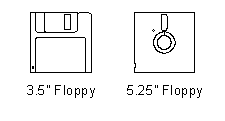| | Storage : Floppy Disks |
|
Floppy disks are magnetic disks. They are portable (can be moved between computers) but have a small storage capacity. Reading and writing data from a floppy disk is very slow. The most common type of floppy disk is the 3.5" disk that can store 1.44Mb of data when it is used on a PC. Older disks were 5.25" or 8" in size but could store much less data.

A floppy disk is manufactured from a flexible plastic disk. This disk is coated with a magnetisable material. For protection the disk is encased in a plastic shell. All sizes of floppy disk have a write protect tab built into the shell. If this tab is set then data can be read from the disk but not written to it. The write protect tab can be used as a security measure to prevent important data being deleted or changed accidentally.
Floppy disks are used for three main purposes :
| Transferring Information | Files can be transferred from one computer to another using a floppy disk. This is possible because floppy disks are portable. Unfortunately the small storage capacity of a floppy disk means that large files can not easily be transferred this way. |
| Backups | Floppy disks can be used to make extra copies (backups) of files that are stored on a computer's hard disk. If the copy of a file on the hard disk is lost or corrupted than the backup copy can be used instead so the file is not lost. Increasingly other media such as magnetic tapes or optical disks are being used instead of floppy disks to store backup files. This is because they are faster at reading and writing data and have much greater storage capacities. |
| Distributing Software | Software can be distributed (sold) on floppy disks. A package may be supplied on up to thirty floppy disks. CD-ROMs are now a more common medium for distributing software because an entire package can be stored on one CD-ROM and a CD-ROM is less vulnerable to physical damage. |
Some hardware companies now produce storage devices which are very similar to floppy disks but can store 100Mb or even 750Mb of data. These devices are also much faster than standard floppy disk drives. An example is the Zip disk.
GCSE ICT Companion 04 - (C) P Meakin 2004